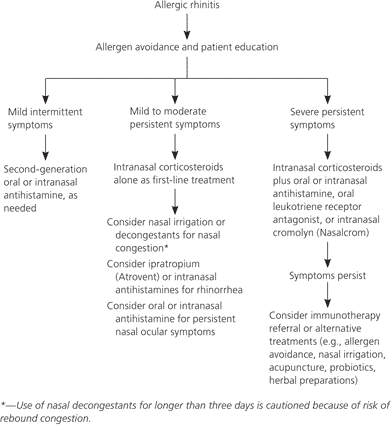Which type of medication is the first-line treatment for nasal congestion?
Nasal Glucocorticoids
Leukotriene Modifiers
Decongestants
Antihistamines
The Correct Answer is A
Nasal glucocorticoids, also known as intranasal corticosteroids, are considered the most effective and recommended first-line treatment for nasal congestion caused by allergic rhinitis or non-allergic rhinitis. They work by reducing inflammation in the nasal passages, relieving congestion, and improving other symptoms such as itching, sneezing, and runny nose.
Leukotriene modifiers, decongestants, and antihistamines can also be used to manage nasal congestion, but they are generally considered second-line options or adjunct therapies.
Decongestants provide temporary relief by constricting blood vessels in the nasal passages, while antihistamines help with symptoms related to allergies. Leukotriene modifiers are primarily used for managing asthma and are not typically the first choice for nasal congestion alone.

Nursing Test Bank
Naxlex Comprehensive Predictor Exams
Related Questions
Correct Answer is ["10"]
Explanation
To determine the mL of diphenhydramine elixir to administer per dose, we need to calculate the dose based on the prescribed amount and the concentration of the elixir.
Given:
Prescribed dose: 25 mg Concentration of elixir: 12.5 mg/5 mL
We can set up a proportion to find the equivalent mL for the prescribed dose: 25 mg / x mL = 12.5 mg / 5 mL
Cross-multiplying and solving for x, we get:
25 mg * 5 mL = 12.5 mg * x mL 125 mg = 12.5 mg * x mL
125 mg / 12.5 mg = x mL 10 mL = x mL
Therefore, the nurse should administer 10 mL of diphenhydramine elixir per dose.
Correct Answer is C
Explanation
Status asthmaticus is a severe and potentially life-threatening asthma exacerbation that does not respond well to usual treatment measures. The primary goal in managing status asthmaticus is to relieve the bronchospasm and improve airflow. Short-acting 62-agonists, such as albuterol, are bronchodilators that work quickly to relax the smooth muscles of the airways, providing immediate relief of bronchospasm.
While determining the cause of the acute exacerbation and obtaining a peak flow reading are important aspects of asthma management, in the case of status asthmaticus, the immediate priority is to administer a bronchodilator to alleviate the severe symptoms and improve the child's breathing. Once the acute symptoms are addressed, further assessment and interventions can be carried out to identify the cause and monitor the child's condition.
Whether you are a student looking to ace your exams or a practicing nurse seeking to enhance your expertise , our nursing education contents will empower you with the confidence and competence to make a difference in the lives of patients and become a respected leader in the healthcare field.
Visit Naxlex, invest in your future and unlock endless possibilities with our unparalleled nursing education contents today
Report Wrong Answer on the Current Question
Do you disagree with the answer? If yes, what is your expected answer? Explain.
Kindly be descriptive with the issue you are facing.
